Q&A with Dean Devlin, Executive Producer of LEVERAGE
Mike Vicic - February 17, 2010
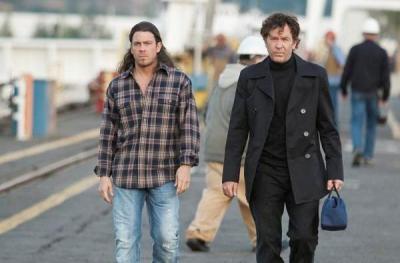
Tonight (Wednesday, Feb. 17, 2010 at 10pm ET/PT) is the Season 2 finale of Leverage, and Executive Producer Dean Devlin took some time out of his busy schedule to answer some questions about the series in a conference call last week. What was the theme of Season 2? Will Jeri Ryan be back in Season 3? Might Hardison and Parker be a couple? Will Con-con be expanded? Keep reading to find the answers to those questions and more!
(If you can't wait 'til 10PM, just scroll to the bottom of the page and watch the preview.)
|
|
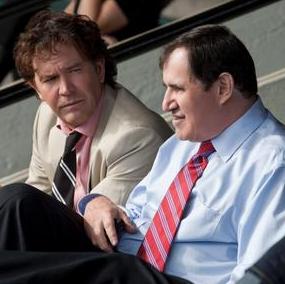 |
Question: The "Three Strikes Job" episode had a lot of twists and turns on its own and almost would have been a pretty satisfying ending on its own but then I see the preview for the second part and it looks like things get even more intense within the group. So what can you tell me about what the team is going to face during the season finale? Dean Devlin: Well you know the theme of the whole second season was really about identity. Before Season 1 began, these were all loners who all worked by themselves, who didn't really have a sense of family. In Season 1, they had come together but the question was could they hold themselves together? |
| And in Season 2 really the question became well, if they're not who they used to be before they got together, who are they now? And so the real exploration in the finale is the culmination of these stories and a discovery really of who they are in relationship to each other, in who they're going to be going forward. You know in this season Sophie had to leave the team to find out who she was. Nate is trying to redefine himself and obviously he's had struggles as he's fallen off the wagon and trying to understand who he is. So this will all culminate in the finale. |
|
|
|
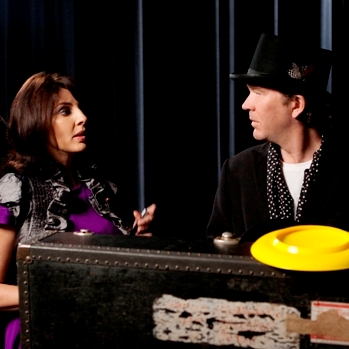 |
Question: I was wondering if you could talk about the decision to have Sophie as such an active participant in the back half of the season. A lot of shows that I know would just kind of say oh, this character has gone off somewhere and never refer to them again, but you know she keeps coming up and she has these really pivotal plot moments with Nate. So can you talk about how you approached her absence and how you decided to work it that way? Dean Devlin: Well you know this was the necessity being the mother of invention, so as Gina's pregnancy came out, we didn't want to just move her off the show. We really wanted to try to keep her there as much as possible. But we had made the decision that it wasn't good for the character for her to have a child, so we needed to work around her pregnancy. |
| But she's such an important part of the show that we didn't want to have her leave the show entirely so we tried to find ways to keep her involved in a meaningful way and yet still try to work around the pregnancy. | |
|
|
 |
Question: They always talk about how you can get so much more depth in TV than you can on movies but that’s so apparent in your career because your movies (Independence Day; Godzilla) have been very big and very visual and "Leverage" is actually one of the thickest and kind of smartest shows as far as elaborate plots. So could you kind of talk about that, how much more it gives you to work on when you're working TV? Dean Devlin: Well you know when I was growing up, television was kind of the really formulaic place and movies is where you got to do really more in depth work. But something kind of happened in the last 20 years which is movies ended up costing more and more money, more and more money spent on marketing, and it became much more risk averse than it was. |
|
So suddenly movies needed to become a little more formulaic and a little bit more based on other material and – because they didn't want to take the risks. Meanwhile, in television, you had this explosion of channels. Instead of there just being three channels and then four channels, there were 500 channels.
And really the only way that they could compete with each other was to be less and less formulaic and to take more chances, take more risks, and allow you to go farther and deeper into your characters.
So in a way it's been – it's been a real flip creatively for people like me where when we used to look at television as a place where we couldn't be that creative, now it's a place we can be much more creative. And then of course, being able to do, I think we've now done 28 episodes you know it really gives you a chance to rewrite the movie every week and to go a little bit farther and a little bit deeper.
And we're blessed with really some of the greatest writers on television. And John Rogers especially and Chris Downey you know these guys really you know they pour blood on these scripts each week. They don't – they don't phone it in you know every script is a labor of love.
So we've been able to go to places that I've been very surprised that we've been able to go to. |
|
|
|
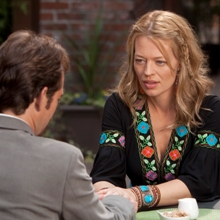 |
Question: Do you know if Jeri Ryan will be back next season? Dean Devlin: We don't know yet. Our hope is to have her come back at least for a couple episodes – don't know what her schedule's going to be. But I think hopefully by the end of the season her character will be so etched in the lore of our show that the fans will want to see that character reoccur. |
|
|
 |
Question: I'm looking at your resume and I see a lot of action adventure. I was wondering, obviously there was some kind of influence, what were you doing as a young teenage boy? Dean Devlin: Well you know as a young teenage boy I was running around with a Super 8mm camera and I was making little films and starting little theater projects. But you know all of my influences really were you know Steven Spielberg and Robert Zemeckis and you know guys like this – George Lucas. So I fell in love with that type of film making and that type of adventure on the screen and that sense of wonder, and I've been chasing that dream ever since. Sometimes successfully, sometimes not so successfully but it's always in my head of the thing that motivated me to want to do this in the first place and you know that's the unreachable star that we keep reaching for. |
|
|
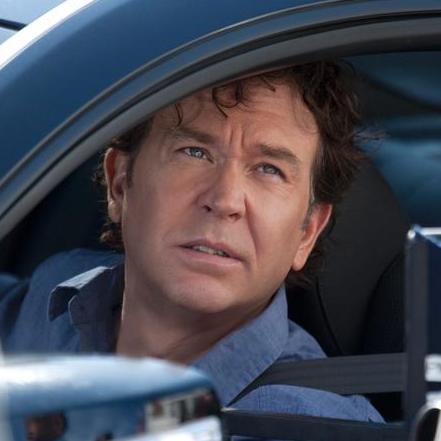 |
Question: You made a couple of acting choices that really I was impressed by. Timothy Hutton, I'd forgotten how good an actor he was until he got on the show and had so many different things he can do every week. And Jeri Ryan, I would have never guessed that. I wouldn't have thought of her as casting here there. Tell me in both of those cases, what was it that made you think that those were the people for the role? Dean Devlin: Well you know listen, I have to be honest and say that it started off as one thing and then evolved because of the talent of these actors. For instance, when we – when we first approached Tim Hutton, it was because we were thinking about the drama of the character you know. |
|
I mean, Tim Hutton is an Academy Award winning actor and the idea of this guy struggling to deal with the death of his son while abandoning every belief he had as far as what's right and what's wrong in the world, we thought of Tim as the actor who could really pull off the complexity and the depth.
What we had not prepared ourselves for was how good he was at comedy and how much fun he could be. And suddenly the character started to evolve very quickly based on how much he was bringing to the table week in and week out.
And to some degree, that's the same with Jeri Ryan. We you know we knew we needed a grifter on our show and we knew that there were going to be several episodes where we really couldn't have Gina Bellman running around because of her pregnancy, and it was actually the network's idea to bring in Jeri Ryan.
And we met with her, and again, we had one impression of Jeri based on her work and soon as we started working with her we realized this well is much deeper than we had ever thought and then it influenced the writing. And then the part started to grow really based on what we're seeing in (dailies) every day. So part of it was fortune on our end, but part of it was really the actors bringing a lot to the table. |
|
|
|
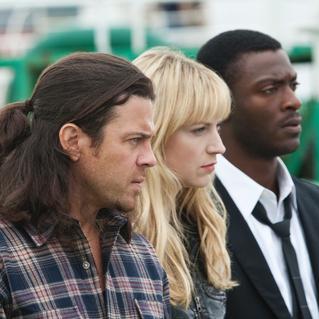 |
Question: Can you talk about the rise of popularity of the show? It's kind of impressed me how it's just seem to have exploded into this – now you've got the music coming out and you've got the convention. Can you talk about that a little bit? Dean Devlin: It's very surprising. We've reached a kind of fandom that is normally reserved for genre shows, for science fiction or something. But I think that there was this hunger out there for a show that wasn't just procedural and dry. |
| While procedural shows can be very compelling, they tend to be cold and edgy, and I think that there was a real hunger for a show that was a lot of fun and yet still had something to say – that still was going after something that was interesting, and a show that didn't talk down to the audience.
And we've been embraced in a way that none of us were expecting. I mean, we were so shocked when all these Web sites started popping up. And of course when we came up with the idea of doing the "Leverage" convention, as soon as we put up the Web site, the servers crashed. So the response out there in the world has been so much faster and so much more embracing than we were expecting and obviously we're humbled and grateful for it, but it's really a shocker for us. We thought it was going to take a lot longer to earn this audience and this much devotion out of our fandom. |
|
|
|
 |
Question: Our readers are very much interested in the CON-con and if it's going to be serialized in different cities. Also too in England we're getting a lot of e-mails, a lot of interest from people from when we posted the news item on this particular event. Will you push it out other locations? Dean Devlin: I think a lot will depend on how this goes. I mean, really, how this started was we were so impressed with the loyalty and support of our fandom that we said, let's throw them a party to just say thanks. You know let's make a weekend party for the fans. |
| And we weren't expecting, again, for it to be embraced this way. I mean, the amount of people flying in from other countries to come to this thing, even countries that – where our show hasn't shown yet. We have people flying in from Germany and the show's never aired there yet. So it's been really surprising this kind of support.
So I think if the weekend goes as well as we hope you know we'd love to franchise this out and let the party grow and play in other places. But I think we have to kind of reserve that to see what happens because it's such an unusual show to do a convention for. I think we'll have to see if people really come and if they enjoy it – but if they do, then we're absolutely open to the idea of expanding this. |
|
|
|
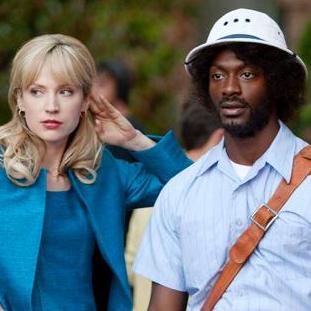 |
Question: I was wondering if you're going to develop further the relationship that sort of started between Hardison and Parker. It seemed like there was a romantic thing going on there last season. Dean Devlin: Well you know we want to be very cautious on how we evolve the relationships and the characters because at their core, these are people who never trusted anyone. And what we discovered especially with the Sophie-Nate relationship that that lack of trust in general has made it difficult for them to have relationships with other humans...these types of intimate love relationships. |
| So one of the things we tried to do early on in the second season was to have Parker really slow down what was happening between her and Hardison but of course we still want it to develop. So these things will continue to develop. All the relationships we want to develop, but we want them to go at as pace that's organic to who these characters are at their core which are people who are cynical and suspicious. So hopefully we'll let those things evolve organically. | |
|
|
 |
Question: TV has deepened its attitude towards alcoholism in recent years. It used to be like Ted Danson on "Cheers," former alcoholic. That was it. He almost never had a problem. In your show, I was really surprised to see Nate fell off the wagon. Dennis Leary did the same in "Rescue Me." Is this like a richer, kind of more realistic view and kind of what made you go that way with Nate? Dean Devlin: Well, I think what we didn't want to do was have everything be pat and easy. You know battling any kind of addiction is hard, and there's hills and valleys, and we didn't think Nate should be immune to that. |
| But also, what we were discovering as we had taken away the alcohol from Nate is that he had substituted one addiction for a different addiction and so suddenly – before it was drinking and now it was a sense – a need to control things. And so he needed to get humbled that he can't control the world and so part of that was losing his ability to control his own drinking.
So this is all part of the evolution of Nate coming to terms with who he is and hopefully you'll see that really reach a climax at the end of the finale as all of these forces come together in a kind of brutal way. |
|
|
|
|
Question: You took it back to Nate in the hospital with his son and you kind of reminded people about you know the core of his struggle. Was that something intentional and how do you approach this show and its storylines when you're coming in to direct the episodes? Dean Devlin: Well, we wanted to show that nothing is ever totally resolved in real life. You know we think we get over the death of someone and then in a most unexpected moment it comes back and hits us again. And just like his alcoholism, he thought he had beaten it and then it sneaks up back into his life. |
|
| Look, our show is essentially a fun con show, but we wanted to show these characters in a way that had some complexity to it and had their personal problems influence the story and plot instead of the other way around.
You know it's so easy to just let the characters go wherever the plot needs it, but we thought it was interesting to say all of these characters are damaged and the things that are damaged about them affects their ability to accomplish what they're trying to accomplish both professionally and personally. So the more we were able to cook that up, the more interesting our stories became and hopefully the less pat they are. You know we like to pride ourselves on trying to do a show where it's not one con a week but it's actually two cons a week and there's only so many cons so it's a very difficult task to pull off. So for us, it was really the character development that could make that original and unique as opposed to just making the story completely plot-driven. |
|
|
|
|
Question: I was curious, one of the largest things that kind of defines this from other shows is that even in some of these very heavy storylines, even like the very heavy personal story lines like Nate's, you still are able to incorporate this sense of comedy in there with just one-liners, things like that. How do you do that from week to week? Dean Devlin: Well, one of the things I think we discovered over the course of the show, of our episodes that were more successful and the ones that weren't quite as successful, is the more we were able to anchor the story in something that had some weight to it, then the more fun we could have in the show without it completely going off the rails. |
|
| So what we try to do is what the story – the underlying story is really about – who our victim is, what's happened to them. You know we want that to have some weight and we want that to somehow be related on a personal level to at least one of the cast members.
Once we have that anchor, we've discovered we can have a lot of fun without the show getting too silly. And that's really been the experiment here is to see how far we can stretch the fun and yet still have a drama underneath that is – that is resonant. And that's really been the journey and we've been actually surprised how we've been able to use comic techniques in a drama such as our flashbacks, which normally they're used in things like you know sitcoms, but we were able to actually use that as a way to both tell dramatic stories and to bring the fun in. So that's kind of tonally been our challenge and the thing I think we're most proud of. |
|
|
|
|
Question: Dean, I know you've done some minor acting on your resume. Any chance we're going to see you make a cameo on "Leverage"? Dean Devlin: In last night's episode, there is a team of sports writers who are on the radio, and if you look at the photograph, it's actually me and John Rogers and it's our voices that come over the radio.
|
|
|
